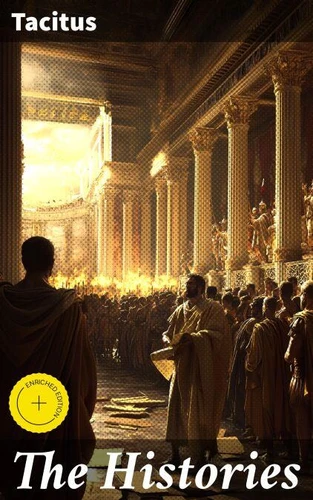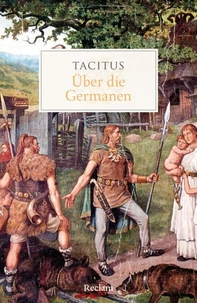The Histories. Enriched edition. Power Struggles and Political Intrigues in Ancient Rome
Par : , , ,Formats :
Disponible dans votre compte client Decitre ou Furet du Nord dès validation de votre commande. Le format ePub est :
- Compatible avec une lecture sur My Vivlio (smartphone, tablette, ordinateur)
- Compatible avec une lecture sur liseuses Vivlio
- Pour les liseuses autres que Vivlio, vous devez utiliser le logiciel Adobe Digital Edition. Non compatible avec la lecture sur les liseuses Kindle, Remarkable et Sony
 , qui est-ce ?
, qui est-ce ?Notre partenaire de plateforme de lecture numérique où vous retrouverez l'ensemble de vos ebooks gratuitement
Pour en savoir plus sur nos ebooks, consultez notre aide en ligne ici
- Nombre de pages217
- FormatePub
- ISBN859-65--4767008-7
- EAN8596547670087
- Date de parution18/11/2023
- Protection num.Digital Watermarking
- Taille1 Mo
- Infos supplémentairesepub
- ÉditeurGOOD PRESS
Résumé
In "The Histories, " Tacitus provides a compelling chronicle of the Year of the Four Emperors (AD 69), a tumultuous period that followed the death of Nero. Written in a terse and incisive style that reflects Tacitus' penchant for brevity and psychological depth, this work employs a mixed narrative approach, blending historical account with poignant political analysis. The text not only documents the power struggles intrinsic to imperial Rome but also offers profound insights into the decay of civic virtue and the nature of tyranny, elucidating the dynamics of autocracy versus democracy.
Tacitus' incorporation of speeches imbues the narrative with dramatic tension, rendering the past vividly alive for contemporary audiences, while his critical stance on corruption and moral decline invites reflection on the cyclical nature of history. Tacitus, born around AD 56 into a prominent Roman family, navigated the complexities of political life during the Julio-Claudian and Flavian dynasties, experiences which fueled his disillusionment with the imperial regime.
His career as a senator and a governor of provinces provided him with a firsthand perspective on the moral ambivalence of power and the fragility of governance, themes poignantly explored in "The Histories." Tacitus' writings are often regarded as a reflection of his struggle with loyalty to the Empire and his commitment to historical truth, making his perspectives invaluable for scholars of Roman history.
Readers seeking to understand the intricacies of imperial Rome and its leaders will find "The Histories" essential. This work not only enriches our understanding of a critical historical juncture but also resonates with contemporary concerns about power, corruption, and human nature. Tacitus' masterful exploration of these themes makes this text a vital read for anyone interested in the legacy of Rome and the lessons it imparts for modern governance. In this enriched edition, we have carefully created added value for your reading experience: - A succinct Introduction situates the work's timeless appeal and themes. - The Synopsis outlines the central plot, highlighting key developments without spoiling critical twists. - A detailed Historical Context immerses you in the era's events and influences that shaped the writing. - An Author Biography reveals milestones in the author's life, illuminating the personal insights behind the text. - A thorough Analysis dissects symbols, motifs, and character arcs to unearth underlying meanings. - Reflection questions prompt you to engage personally with the work's messages, connecting them to modern life. - Hand-picked Memorable Quotes shine a spotlight on moments of literary brilliance. - Interactive footnotes clarify unusual references, historical allusions, and archaic phrases for an effortless, more informed read.
Tacitus' incorporation of speeches imbues the narrative with dramatic tension, rendering the past vividly alive for contemporary audiences, while his critical stance on corruption and moral decline invites reflection on the cyclical nature of history. Tacitus, born around AD 56 into a prominent Roman family, navigated the complexities of political life during the Julio-Claudian and Flavian dynasties, experiences which fueled his disillusionment with the imperial regime.
His career as a senator and a governor of provinces provided him with a firsthand perspective on the moral ambivalence of power and the fragility of governance, themes poignantly explored in "The Histories." Tacitus' writings are often regarded as a reflection of his struggle with loyalty to the Empire and his commitment to historical truth, making his perspectives invaluable for scholars of Roman history.
Readers seeking to understand the intricacies of imperial Rome and its leaders will find "The Histories" essential. This work not only enriches our understanding of a critical historical juncture but also resonates with contemporary concerns about power, corruption, and human nature. Tacitus' masterful exploration of these themes makes this text a vital read for anyone interested in the legacy of Rome and the lessons it imparts for modern governance. In this enriched edition, we have carefully created added value for your reading experience: - A succinct Introduction situates the work's timeless appeal and themes. - The Synopsis outlines the central plot, highlighting key developments without spoiling critical twists. - A detailed Historical Context immerses you in the era's events and influences that shaped the writing. - An Author Biography reveals milestones in the author's life, illuminating the personal insights behind the text. - A thorough Analysis dissects symbols, motifs, and character arcs to unearth underlying meanings. - Reflection questions prompt you to engage personally with the work's messages, connecting them to modern life. - Hand-picked Memorable Quotes shine a spotlight on moments of literary brilliance. - Interactive footnotes clarify unusual references, historical allusions, and archaic phrases for an effortless, more informed read.
In "The Histories, " Tacitus provides a compelling chronicle of the Year of the Four Emperors (AD 69), a tumultuous period that followed the death of Nero. Written in a terse and incisive style that reflects Tacitus' penchant for brevity and psychological depth, this work employs a mixed narrative approach, blending historical account with poignant political analysis. The text not only documents the power struggles intrinsic to imperial Rome but also offers profound insights into the decay of civic virtue and the nature of tyranny, elucidating the dynamics of autocracy versus democracy.
Tacitus' incorporation of speeches imbues the narrative with dramatic tension, rendering the past vividly alive for contemporary audiences, while his critical stance on corruption and moral decline invites reflection on the cyclical nature of history. Tacitus, born around AD 56 into a prominent Roman family, navigated the complexities of political life during the Julio-Claudian and Flavian dynasties, experiences which fueled his disillusionment with the imperial regime.
His career as a senator and a governor of provinces provided him with a firsthand perspective on the moral ambivalence of power and the fragility of governance, themes poignantly explored in "The Histories." Tacitus' writings are often regarded as a reflection of his struggle with loyalty to the Empire and his commitment to historical truth, making his perspectives invaluable for scholars of Roman history.
Readers seeking to understand the intricacies of imperial Rome and its leaders will find "The Histories" essential. This work not only enriches our understanding of a critical historical juncture but also resonates with contemporary concerns about power, corruption, and human nature. Tacitus' masterful exploration of these themes makes this text a vital read for anyone interested in the legacy of Rome and the lessons it imparts for modern governance. In this enriched edition, we have carefully created added value for your reading experience: - A succinct Introduction situates the work's timeless appeal and themes. - The Synopsis outlines the central plot, highlighting key developments without spoiling critical twists. - A detailed Historical Context immerses you in the era's events and influences that shaped the writing. - An Author Biography reveals milestones in the author's life, illuminating the personal insights behind the text. - A thorough Analysis dissects symbols, motifs, and character arcs to unearth underlying meanings. - Reflection questions prompt you to engage personally with the work's messages, connecting them to modern life. - Hand-picked Memorable Quotes shine a spotlight on moments of literary brilliance. - Interactive footnotes clarify unusual references, historical allusions, and archaic phrases for an effortless, more informed read.
Tacitus' incorporation of speeches imbues the narrative with dramatic tension, rendering the past vividly alive for contemporary audiences, while his critical stance on corruption and moral decline invites reflection on the cyclical nature of history. Tacitus, born around AD 56 into a prominent Roman family, navigated the complexities of political life during the Julio-Claudian and Flavian dynasties, experiences which fueled his disillusionment with the imperial regime.
His career as a senator and a governor of provinces provided him with a firsthand perspective on the moral ambivalence of power and the fragility of governance, themes poignantly explored in "The Histories." Tacitus' writings are often regarded as a reflection of his struggle with loyalty to the Empire and his commitment to historical truth, making his perspectives invaluable for scholars of Roman history.
Readers seeking to understand the intricacies of imperial Rome and its leaders will find "The Histories" essential. This work not only enriches our understanding of a critical historical juncture but also resonates with contemporary concerns about power, corruption, and human nature. Tacitus' masterful exploration of these themes makes this text a vital read for anyone interested in the legacy of Rome and the lessons it imparts for modern governance. In this enriched edition, we have carefully created added value for your reading experience: - A succinct Introduction situates the work's timeless appeal and themes. - The Synopsis outlines the central plot, highlighting key developments without spoiling critical twists. - A detailed Historical Context immerses you in the era's events and influences that shaped the writing. - An Author Biography reveals milestones in the author's life, illuminating the personal insights behind the text. - A thorough Analysis dissects symbols, motifs, and character arcs to unearth underlying meanings. - Reflection questions prompt you to engage personally with the work's messages, connecting them to modern life. - Hand-picked Memorable Quotes shine a spotlight on moments of literary brilliance. - Interactive footnotes clarify unusual references, historical allusions, and archaic phrases for an effortless, more informed read.







